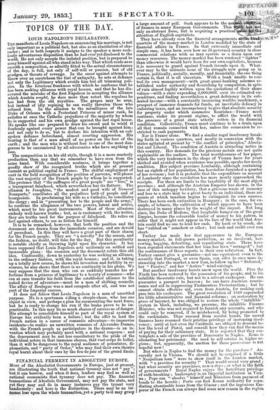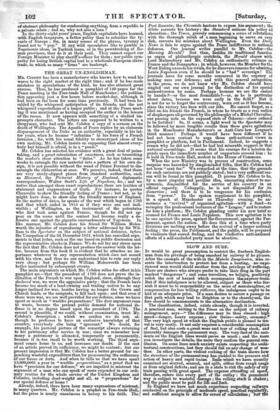FINANCIAL FERMENT IN ABSOLUTIST EUROPE. Mosr of the Absolutist Governments
in Europe, just at present, are illustrating the truth that national tyranny does not " pay "; but it can borrow, and when it does, lenders may find as well as national economists that tyranny does not pay. The financial transactions of Absolute Government, may not pay the state, and yet they may and do in many instances pay the tyrant very handsomely : and here is the distinction. There may be an im- mense loss upon the whole transaction, yet a party to it may grasp a large amount of pelf. Such appears to be the no • ".1 • . m • • .
of finance in many European Governments. This only an abstract force, but is acquiring a practical • '- attention of English capitalists.411114.4
They have already seen the financial arrangements 00166%4g /4/131`1 quarters of the money-market in London modified by the state of financial affairs in France. In that extremely immediate and simple case, it has been seen how an ill-governed country in close commercial relations with us may operate as a drain upon our money resources. The money-market has been rendered " tighter" than otherwise it would have been for our own capitalists, because itis necessary to guard against French inroads upon it. What- ever may be the ultimate issue of the struggle now going on in France, politically, socially, morally, and financially, the one thing certain is, that it is all uncertain. With a bank unable to con- trol its own management—with great quasi-banking schemes es- tablished under authority and flourishing by compulsion, in spite of ruin almost legibly written upon the quotations of their share values—with a state expending 2,000,0001. over its estimated ex- penditure, and finding nevertheless a great deficiency in its esti- mated income—with a constantly increasing warlike machinery, a
i prospect of immense demands for funds, an inevitable delicacy in enforcing taxes, and an incompetency to give that absolute security for property under which commerce flourishes—France must continue, under its present regime, to afflict the world with the presence of a great state utterly rotten in its financial condition. Collectively, France must continue to be a drain upon all that remain connected with her, unless the connexion be re- stricted to cash payments. Nor is France alone. We find a similar regal insolvency break- ing forth in various quarters, and mostly in connexion with the states agitated at present by " the conflict of principles," Absolu- tist and Liberal. The condition of Austria is attracting notice in this country. Her demands for the precious metals are not quite explainable on the surface. The total worthlessness of her paper, which the very tradesmen in the shops of Vienna have for years shirked and avoided when avoidance was possible, speaks her needy condition. Her subject province Lombardy, although containing but an eighth of her population, has heretofore furnished a quarter of her revenue ; but it is probable that the expenditure on account of Lombardy since the revolution has more nearly approached the receipts. For there are limits to the taxability of the most abject province ; and although the Austrian Emperor has shown, in the case of this unhappy territory, that a grievous waste of economy and loss to a state may be a great booty to an individual, there are points at which taxation begins to extinguish its own sources. There has been such extinction in Hungary ; in the case, for ex- ample, of tobacco, the cultivation of which appears to have been destroyed in many places by the weight of the impost. Not long since, the Duke of Modena, that laughable hanger-on of the great Empire, became the colourable lender of money to his patron, in order that it might not appear in the face of the world that Aus- tria could find no one to lend her oash. By hook or by crook, she has "rubbed on " somehow or other; but cash and credit ever run. short.
Turkey has made her first appearance in the European money-market, in full-grown perfection, as an insolvent, bor- rowing, begging, defaulting, and repudiating state. There have been repeated statements that her loan has been " arranged" ; but the continuance of these reports is their own refutation. In fact, Turkey cannot give a guarantee—not one equivalent even to the security that Portugal, or even Spain, can offer iu once more in- sinuating into the market a new loan, follow up her " Deferred," her " Passive," and her " Active " wind-raisings.
But another insolvency bursts anew upon the world. Pius the Ninth has been restored to the possession of his people, and to his infallible theocratic rule, but not to a solvent exchequer. He can guarantee a passport t;:, heaven ; he can have Austrian counte- nance and aid in suppressing Piedmontese Protestantism ; but he cannot obtain effective aid, even from Austria, for making cash pass into his exchequer. The great revolution of 1848 superseded his little administrative and 'financial reforms ; on restoration by grace of bayonet, he was obliged to restore the whole " infallible ' system in block, including, we presume, the infallible Finance Minister, who was not required to furnish any accounts, and who could only be removed, if he misbehaved, by being promoted to the cardinalate. Thus rescued from secular hands, the sacred finances have resumed their pristine privilege of increasing insol- vency ; until at last even the Cardinals are obliged to descend be- low the level of Pistol, and consult how they can find the means of paying for their sublunary state. It is reported that they con- template a sale of the province of Benevento to Naples. Rome is alienating her patrimony. She used to sell estates iu higher re- gions • but, apparently, the auction for those possessions is not hopeful now !
But where is Naples to find the money for the purchase ? As- suredly not in Vienna. We should not be surprised if a little " Neapolitan loan " were to show itself in the London market,
with " a province for security !" That would sound very grand • but what security are provinces, now-a-days ; or what is the faith of governments ? Royal Naples enjoys the hereditary privilege of oath-breaking ; bankruptcy is an Imperial institution in Vien- na • Pope can " absolve himself and Ministers from payment of bonds to the heretic ; Porte can find Koran authority for repu- diating abominable loans from the Giaour ; and the ingenious Em- peror of the French can always find some new reason in the region
of abstract philosophy fort confiscating anything, from a republic to a private estate ; and so,. why not also a loan ? In the thirty-eight years' peace, English capitalists have learned, with English taxpayers, a better policy than to subsidize the ty- rants of Europe ; for, in many senses of the phrase, tyranny is found not to " pay." If any wild speculators like to gamble in Napoleonic ideas, in Turkish loans, or in the pawnbroking of Ro- man provinces, they do it at their peril. They cannot expect our Foreign Minister to play sheriff's-officer for them ; nor public sym- pathy for losing British capital lent to a wholesale European slave, trade, in which so many "firms" are bankrupt.



























 Previous page
Previous page